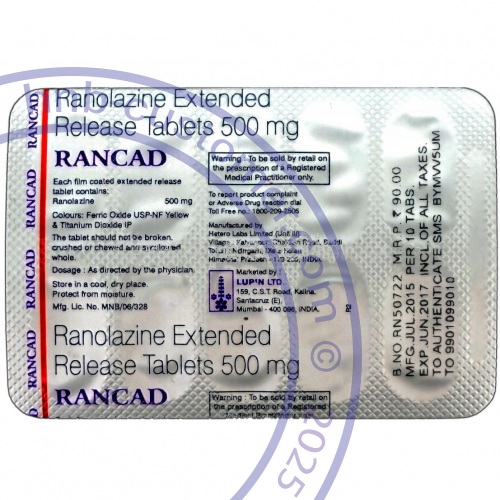What is ranolazine?
Ranolazine is an anti-anginal medication. It works by improving blood flow to help the heart work more efficiently.
Ranolazine is used to treat chronic angina (chest pain). Ranolazine is not for use during an acute (emergency) attack of angina.
Ranolazine may also be used for purposes not listed in this medication guide.
What is the most important information I should know about ranolazine?
You should not take ranolazine if you have cirrhosis of the liver.
Serious drug interactions can occur when certain medicines are used together with ranolazine. Tell each of your healthcare providers about all medicines you use now, and any medicine you start or stop using.
What should I discuss with my health care provider before taking ranolazine?
You should not take ranolazine if you are allergic to it, or if you have cirrhosis of the liver.
Many other drugs can interact with ranolazine and should not be used at the same time. Your doctor may need to change your treatment plan if you use any of the following drugs:
-
clarithromycin;
-
nefazodone;
-
St. John's wort;
-
antifungal medicine--itraconazole, ketoconazole;
-
HIV or AIDS medicine--indinavir, lopinavir/ritonavir, nelfinavir, ritonavir, saquinavir;
-
tuberculosis medicine--rifabutin, rifampin, rifapentine; or
-
seizure medicine-carbamazepine, phenobarbital, phenytoin.
To make sure ranolazine is safe for you, tell your doctor if you have:
-
a heart rhythm disorder;
-
liver disease;
-
kidney disease; or
-
a personal or family history of long QT syndrome.
It is not known whether this medicine will harm an unborn baby. Tell your doctor if you are pregnant or plan to become pregnant.
It is not known whether ranolazine passes into breast milk or if it could harm a nursing baby. Tell your doctor if you are breast-feeding a baby.
How should I take ranolazine?
Follow all directions on your prescription label. Your doctor may occasionally change your dose to make sure you get the best results. Do not use this medicine in larger or smaller amounts or for longer than recommended.
Ranolazine may be taken with or without food.
Do not crush, chew, or break an extended-release tablet. Swallow it whole.
Call your doctor if your symptoms do not improve, or if they get worse while using ranolazine.
Chronic angina is often treated with a combination of drugs. Use all medications as directed by your doctor. Read the medication guide or patient instructions provided with each medication. Do not change your doses or medication schedule without your doctor's advice.
Store at room temperature away from moisture and heat.
What happens if I miss a dose?
Take the missed dose as soon as you remember. Skip the missed dose if it is almost time for your next scheduled dose. Do not take extra medicine to make up the missed dose.
What happens if I overdose?
Seek emergency medical attention.
Overdose can cause nausea, vomiting, numbness or tingling, dizziness, double vision, confusion, or fainting.
What should I avoid while taking ranolazine?
Ranolazine may impair your thinking or reactions. Be careful if you drive or do anything that requires you to be alert.
Grapefruit and grapefruit juice may interact with ranolazine and lead to unwanted side effects. Discuss the use of grapefruit products with your doctor.
Ranolazine side effects
Get emergency medical help if you have signs of an allergic reaction: hives; difficult breathing; swelling of your face, lips, tongue, or throat.
Call your doctor at once if you have:
-
a light-headed feeling, like you might pass out;
-
headache with chest pain and severe dizziness, fast or pounding heartbeats; or
-
kidney problems--little or no urination, painful or difficult urination, swelling in your feet or ankles, feeling tired or short of breath.
Common side effects may include:
-
nausea, constipation;
-
headache; or
-
dizziness.
This is not a complete list of side effects and others may occur. Call your doctor for medical advice about side effects.
What other drugs will affect ranolazine?
Many drugs can interact with ranolazine. Not all possible interactions are listed here. Tell your doctor about all your medications and any you start or stop using during treatment with ranolazine, especially:
-
an antibiotic or antifungal medicine;
-
any other medicine to treat heart disease;
-
cholesterol-lowering medicine;
-
diabetes medication;
-
medicine to prevent organ transplant rejection;
-
medicine to treat a mental illness; or
-
medicine to treat or prevent nausea and vomiting caused by chemotherapy or radiation.
This list is not complete and many other drugs can interact with ranolazine. This includes prescription and over-the-counter medicines, vitamins, and herbal products. Give a list of all your medicines to any healthcare provider who treats you.





